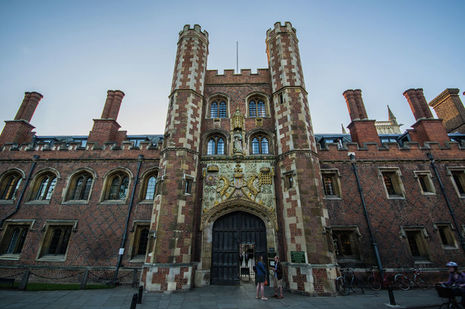Light News – Week 3: Modernised Manuscripts, Chief Medical Scarecrows and Turing Testimonials
In this week’s lighter news, St John’s digitised manuscripts, Chief Medical Scarecrows were spotted in the Cambridgeshire countryside, and an exhibition has been launched to celebrate the life and works of Alan Turing

Modernised Manuscripts
A medieval manuscript that has been held within the archives of St John’s for nearly 400 has been published online for the first time.
Detailed images of ‘Manuscript (MS) D.6,’ a rare 13th-century religious text were digitised by the college in an attempt to aid researchers forced to work away from Cambridge during the current lockdown.
Kathryn McKee, Sub-Librarian and Special Collections Librarian at St John’s, said: “This manuscript is a finely written and beautifully illustrated example of early 13th-century work. Any manuscript that is digitised gives greater potential for research because it means that scholars who are working remotely from Cambridge have the chance to study it in great detail.”
The original 377-page manuscript was given to the college by the Earl of Southampton in 1635 and has been housed within the college’s Old Library ever since. The manuscript is a rare ‘glossed’ edition - meaning it is annotated within the margins and between the text to provide translations and context for the reader.
The manuscript can be viewed through the Cambridge Digital Library, which allows visitors to zoom in and out of each digitised page – showcasing the manuscript in much finer details than possible with the naked eye.
McKee added: “It is only with the high-quality photography that you can appreciate some of the techniques used. It is fascinating.”
Chief Medical Scarecrows
Professor Chris Whitty has become an unlikely artist’s muse after residents of a Cambridgeshire village turned the Chief Medical Officer into a scarecrow.
Residents sculpted the professor as part of their village’s VE scarecrow competition.
My village in Cambridgeshire is having a scarecrow competition for VE Day. Someone has created a scarecrow Chris Whitty. pic.twitter.com/VIrNfgxQIC
- Louise Martin (@louisemartin25) May 8, 2020
Professor Whitty, 55, has become a household name after appearing almost daily at the Government’s Downing Street press conferences. Cornish artist Penny Lally recently created a sculpture of Whitty.
A dedicated online fan club, ‘The Chris Whitty Appreciation Society’, has also been created.
The Society is currently selling merchandise such as mugs and t-shirts, sporting the epidemiologist’s face, to raise money for NHS charities.
I love you @CMO_England... pic.twitter.com/YEc3I2Z5G0
- Tyrone (@Tyrone__C) May 2, 2020
Turing Testimonials
The King’s College Archive Centre have launched an online exhibition dedicated to the life and work of codebreaker and mathematician Alan Turing.
Most widely known for his critical work in cracking the German enigma code at Bletchley Park during the second world war, Turing read mathematics at King’s between 1931-1934, and was elected a fellow of the college in 1935.
The online exhibition includes archival documents relating to Turing’s time at King’s, as well as personal artefacts such as family photographs and letters.
Last week King’s also responded to reports that a sculpture designed by artist Sir Antony Gormley was to be erected at the college to celebrate Turing’s legacy.
A college spokesperson told Varsity: “King’s is delighted that Antony Gormley, perhaps the most internationally admired English sculptor working today, and a Cambridge alumnus, has been inspired to design a sculpture in celebration of Turing.
“While this figure certainly echoes our technological age, it also reflects in its posture both Turing’s intellectual aspiration and his human vulnerability.”
The exhibition can be accessed through the King’s College website and is free to view.
Plant Based Plastics
Cambridge academics who are developing the world’s first plant-based replacement for harmful single-use plastics announce a £2 million funding boost.
Xampla, a University of Cambridge spin-out company, have developed an innovative process using the proteins of everyday plants to create materials similar to synthetic plastics, which decompose naturally without harming the environment.
Simon Hombersley, Xampla CEO, explained: “Our mission is to reduce the impact of single-use plastic, and our initial commercial focus is on intentionally-added microplastics.
“With our new plant protein material, we are committed to helping manufacturers make the transition from traditional plastics to high-performance alternatives that protect the planet.”
Manufacturers currently use microcapsules made from synthetic plastics which, when washed down the drain, pollute the environment.
 News / Colleges charge different rents for the same Castle Street accommodation2 March 2026
News / Colleges charge different rents for the same Castle Street accommodation2 March 2026 News / King’s hosts open iftar for Ramadan3 March 2026
News / King’s hosts open iftar for Ramadan3 March 2026 Theatre / Lunatics and leisure centres 4 March 2026
Theatre / Lunatics and leisure centres 4 March 2026 News / Angela Merkel among Cambridge honorary degree nominees27 February 2026
News / Angela Merkel among Cambridge honorary degree nominees27 February 2026 News / News in Brief: waterworks, wine woes, and workplace wins 1 March 2026
News / News in Brief: waterworks, wine woes, and workplace wins 1 March 2026








